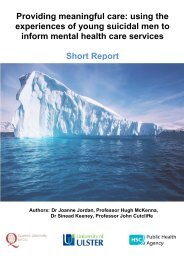Saving Mothers' Lives: - Public Health Agency for Northern Ireland
Saving Mothers' Lives: - Public Health Agency for Northern Ireland
Saving Mothers' Lives: - Public Health Agency for Northern Ireland
Create successful ePaper yourself
Turn your PDF publications into a flip-book with our unique Google optimized e-Paper software.
34<br />
1 Which mothers died, and why<br />
and cultural and geographical isolation meant they were also probably unaware of the maternity services<br />
available and where and how to access them. In this triennium at least one other such woman appears to<br />
have died <strong>for</strong> the same reasons. In previous Reports the majority of these women came from Thailand, but<br />
in this triennium three Vietnamese women also died.<br />
New countries of the European Union (EU)<br />
There were several maternal deaths of women who had recently arrived from countries newly admitted to<br />
the European Union. This refl ects the experiences of the maternity services in general who report rising<br />
numbers of women from the expanded EU, many of whom do not speak English. As there are now 49<br />
countries in Europe, with some of the best and poorest maternal health outcomes in the world, providing<br />
translation services is an ever increasing challenge. For the fi rst time in this Report, there were a few<br />
maternal deaths in women from Turkey, an EU accession country.<br />
“<strong>Health</strong> tourism”<br />
Deaths amongst pregnant women who had specifi cally travelled to the UK <strong>for</strong> NHS health care is a new<br />
category <strong>for</strong> this Enquiry. There were at least fi ve cases where women with pre-existing or past medical<br />
or obstetric complications came to the UK <strong>for</strong> NHS treatment. From the case details provided it is also<br />
possible six other women, who claimed to be refugees, may have entered the UK in order to obtain<br />
medical assistance. One European holiday maker, early in pregnancy, died of a pulmonary embolism<br />
shortly after her arrival.<br />
Translation<br />
Thirty-four women who died from maternal causes, another six who died from Coincidental causes, and<br />
eight who died some months after childbirth spoke little or no English. Very few had access to translation<br />
services and in most cases family members or friends were used as interpreters. Several of these were the<br />
woman’s own children, who may have been the only family members who could speak English. The use of<br />
family members or friends as translators causes concern because:<br />
• The woman may be too embarassed to seek help <strong>for</strong> intimate concerns or discuss her past history<br />
• It is not clear how much correct in<strong>for</strong>mation was conveyed to the woman as the person who was<br />
interpreting did not have a good grasp of the language, or may have withheld in<strong>for</strong>mation. In some<br />
cases the woman’s pre-existing medical condition meant she was at considerable risk<br />
• In some cases the translator was a perpetrator of domestic abuse against his partner, thus not<br />
enabling her to ask <strong>for</strong> advice or help<br />
• It is not appropriate <strong>for</strong> a child to translate intimate details about his or her mother and unfair on<br />
both the woman and child.<br />
Cultural practices and /or attitudes of male partners<br />
Some women who died seemed to have been denied access to care because of cultural beliefs and<br />
practices where the responsibility <strong>for</strong> decision-making fell to their husbands or other family members. This<br />
was especially true <strong>for</strong> women who could not speak English. For example:<br />
A pregnant woman who spoke no English had a port of arrival chest x-ray which was indicative<br />
of cardiac disease. Her English speaking husband was told by the port authorities that she



